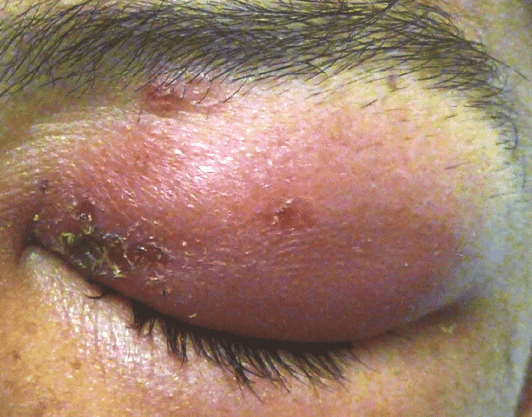Eye or ocular herpes is a viral eye infection characterized by pain, inflammation, and discharge. The most common culprit is the herpes simplex virus (HSV), although other viruses can also induce ocular herpes.
According to the American Academy of Ophthalmology, about 24,000 new cases of eye herpes are identified annually in the United States.
## **Types of Eye Herpes (Ocular Herpes)**
The most frequent type of eye herpes is epithelial keratitis, where the infection impacts the cornea’s thin outermost layer, known as the epithelium.
Another variant affects the deeper layer of the cornea called the stroma, resulting in a condition known as stromal keratitis.
Stromal keratitis is more severe than epithelial keratitis as it can cause extensive corneal damage, potentially leading to blindness and repeated flare-ups.
## **Eye Herpes Symptoms**
Eye herpes symptoms include eye redness, a burning sensation, and discharge. Individuals might also encounter sharp or stabbing pain in one or both eyes, which can extend to the face, neck, or back. Severe infections involving the cornea and conjunctiva (the front area of the eye) can result in vision loss.
Additional symptoms of eye herpes include:
– Sensitivity to light
– Inflamed eyelids
– Frequent tearing
– Red blisters on the upper eyelid
These [herpes symptoms](https://bridgecanhealth.com/herpes-symptoms/) typically emerge within two to four days post-exposure, persisting for several days. Proper treatment can help shorten the duration of these symptoms.
Eye herpes might be mistaken for conjunctivitis, also known as pink eye. While both conditions can be viral, conjunctivitis can also be triggered by allergens, bacteria, or chemicals, unlike eye herpes.
## **Effective Ways to Prevent Eye Herpes**
To prevent the recurrence of eye herpes, maintaining good hygiene is essential. Clean your eyes regularly and wear gloves when applying eye drops to prevent contamination. Limiting UV exposure can also help, so wearing sunglasses outdoors is advisable. Avoid rubbing your eyes to prevent spreading the virus and further irritation. Regularly washing your eyes with clean water can also be beneficial.
Although eye herpes generally heals within 1 to 2 weeks, it can sometimes take longer. Treatment with [herpes medications](https://bridgecanhealth.com/herpes/) is crucial to minimizing the risk of complications.
